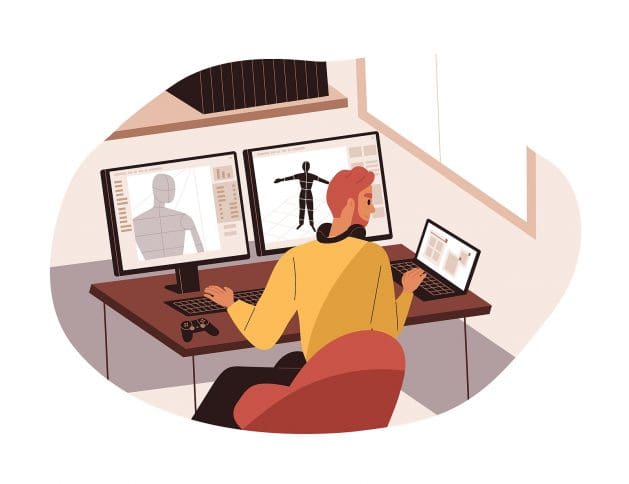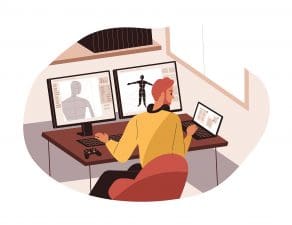
Augmented Reality (AR) and Virtual Reality (VR) spaces are growing, and their need for specialized teams is too. Such specialized teams are ideally adept at not just creating the most fantastic experiences in these digital realms, but also making them accessible to all. Here are four facts about emerging jobs in digital creative fields as well as three jobs that are needed for a more accessible future.
Content is difficult to access
As much as we wish content in the digital space was easily accessible no matter where or who accesses it, that isn’t the case. Instead, content is difficult to access on the web, especially if you live with a disability.
Also on Mediabistro


When things like keyboard navigation, captions, alt text, and audio aren’t available, content becomes inaccessible to a massive pool of people.
The experience isn’t the same for everyone
People also raise awareness about how the digital experience differs between those who are and aren’t living with a situational, temporary, or permanent disability. The whole point of accessibility is to ensure things are accessible and enjoyable for all people.
Many brands and businesses make their respective digital experiences accessible to most people. But unfortunately, they’re hardly the exciting experience that those living without a disability get.
AR and VR Tech isn’t affordable for everyone
AR and VR require tech accessories. You can access AR with a smartphone, while VR requires a headset device to engage. In addition, you might need other accessories like apps and games, a treadmill, hand controllers, a game system, or a joystick to enhance either experience.
Unfortunately, these accessories can be expensive. For example, the best VR headsets can cost you upwards of $500 apiece. If these accessories don’t become more affordable, AR and VR experiences won’t ever be accessible to everyone.
Internet access is still an issue
And what about the internet? AR and VR experiences need some sort of internet connection to work correctly.
Many households struggle to afford internet service, and various others don’t have it at all. So, there’s a continuing conversation about making the internet more affordable to become that much more accessible.
So, who will we need for a better, more accessible future in the digital space?
As we work to solve some of the digital world’s accessibility challenges, we’ll need teams with specific digitally-focused specializations to do it. At the very least, our future is in the hands of individuals who specialize in visualizations and implementation of accessibility in the AR and VR space.
You can pursue many creative careers to help make our future in the digital space more inclusive and enjoyable for everyone, regardless of experience, background, or ability. We’ll start you off with three emerging niches rooted in creativity.
3D Artists
The next generation of creators should be well-versed in 3-dimensional art. A 3D artist creates 3D models of products, environments, and other creations in creative projects, virtual worlds, games, AR experiences, and other digital spaces.
For example, let’s say you’re interested in the metaverse. Specifically, the real estate economy within the metaverse platform is booming. As the demand for metaverse real estate agents grows, so does the need for 3D artists.
This is because 3D artists are the go-to source for guidance on making real estate more appealing to buyers in the metaverse. You can help model the things folks are attracted to in real life, like great landscaping and lighting in metaverse real estate.
If you want to build a memorable brand in the metaverse, or one that uses VR and AR effectively, 3D artists can help craft the necessary unique experience.
NFT Designers
Non-fungible tokens (NFTs) are exploding in popularity. NFTs are essentially digital collector’s items. They’re used in the metaverse and other virtual worlds. They also can’t be replicated because they’re etched into the blockchain.
A digital piece of art, an in-game item, 3D fashion, GIFs, and metaverse real estate are great examples of NFTs. All of which come alive at the hands of an NFT designer. You can create digital artworks for brands and mint and sell them as NFTs once they’re finished. You can also help navigate emerging NFT platforms to find the best home for your creations.
Web Accessibility Specialists
Whether it’s the metaverse, AR, VR, or another digital experience, it should be accessible to everyone. Regardless of ability or background, an individual should be able to access any digital space and be captivated by it.
A web accessibility specialist can test digital experiences for accessibility inefficiencies and improve them to meet accessibility standards. So, if you want to focus more on the technical aspects of inclusion and accessibility, this could be an excellent role for you.
There are many topics surrounding accessibility in the digital world to discuss. Affordable tech accessories and internet, content accessibility, and vying for the same exceptional experience for everyone are just a few.
Pursuing your dream job in one of the emerging niches mentioned above can help form a more inclusive, accessible, and enjoyable digital world for all.







